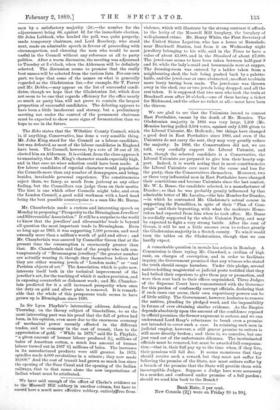A remarkable question in morals has arisen in Bombay. A
Commission is there trying Mr. Crawford, a civilian of high rank, on charges of corruption, and in order to facilitate inquiry, the Government promised that any witness who stated the truth should escape harmless. Under this pledge, several natives holding magisterial or judicial posts testified that they had bribed their superiors to give them pay or promotion, and were then sent back to their offices unpunished. Three Judges of the Supreme Court have remonstrated with the Governor for this pardon of confessedly corrupt officials, declaring that if such eases can occur, their own supervisory powers can be of little utility. The Government, however, hesitates to remove the natives, pleading its pledged word, and the impossibility in future of ever obtaining similar evidence. As the Empire depends absolutely upon the amount of the confidence reposed in official promises, the former argument is serious, and we can understand Lord Reay's reluctance to break even a promise not intended to cover such a case. In retaining such men in judicial employ, however, a still graver promise to suitors is still more directly broken ; and there is, we conceive, but one just road out of the unfortunate dilemma. The incriminated officials must be removed, but must be awarded full compensa- tion,—that is, their full pay up to the time when, if they live, their pensions will fall due. It seems monstrous that they should receive such a reward, but they must not suffer for believing the promise of the State, nor must suitors suffer by a breach of the promise that the State will provide them with incorruptible Judges. Suppose a Judge here were accessory to a murder, and confessed under promise of a full pardon ; should we send him back to the Bench ?


































 Previous page
Previous page